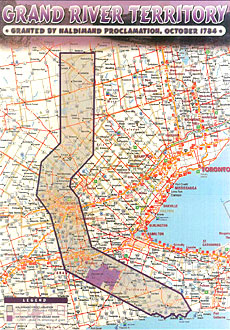Original Story: http://www.cbc.ca/canada/toronto/story/2008/01/15/six-nations.html
Last Updated: Tuesday, January 15, 2008 | 11:04 AM ET
CBC News
A letter from the Six Nations asserting jurisdiction all along the Grand River watershed is being taken seriously, the Kitchener mayor says.
The Haudenosaunee Development Institute, which handles economic development issues for Six Nations, sent a letter last Septemberasserting aboriginal title over much of the land adjacent to the river, all the way from Lake Erie to Grey County, and the institute says it will begin a public campaign for its assertion later this month.

Carl Zehr, the mayor of Kitchener, confirmed he received a letter from the institute that demands a say in future developments and a share of development fees.
"I didn’t take it as a particular threat, it was obviously stating a strong position and that goes into our memory bank, in terms of how we deal with the issue in the future," said Zehr.
Zehr has vivid memories of what happened in Caledonia two summers ago when a dispute over a housing development escalated.
"Clearly," said Zehr, "no municipality, no neighbourhood, would want that kind of confrontation."
Zehr said he and regional councillors in the Kitchener-Waterloo area are willing to talk with the Six Nations. A delegation has met with them already.
Toronto lawyer Aaron Detlor, who heads the Six Nation’s Haudenosaunee Development Institute, said this is just the start.
"We are going to go out, and identify specific areas where it’s clear there’s been no surrender and no payment, and go and advise people, this is not your land. There’s no more of this sweeping it under the rug. It’s not OK to steal land anymore and we’re going to make people aware of that," he said.
Six Nations members have written to municipalities, reminding them of the massive land grant of 1784 that gave the Confederacy rights to 10 kilometres of land on either side of the river.
Later this month, the four-month-old Haudenosaunee Development Institute plans to send out flyers and start radio and newspaper ads asserting jurisdiction.
Detlor said that demanding a say in developments on disputed land is not an act of provocation. He said it should have the opposite effect, and avoid conflict.
"This assertion of jurisdiction could easily be portrayed as something that’s going to raise the temperature, so to speak. But really what it’s going to do is set a long-term temperature we can all live with," he said.
Detlor said municipal leaders should press the federal andprovincial governments to find a global solution to Six Nations claimsso each municipality won’t have to forge its own development agreement.
Next Story:

